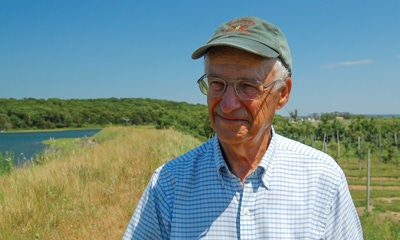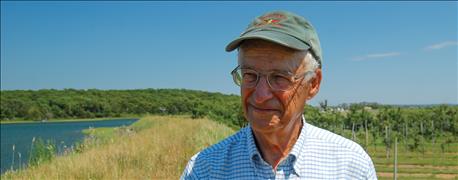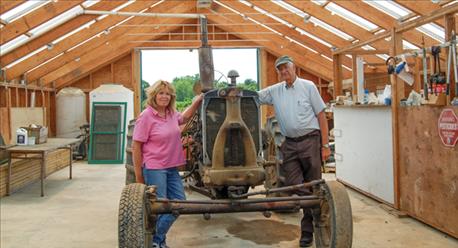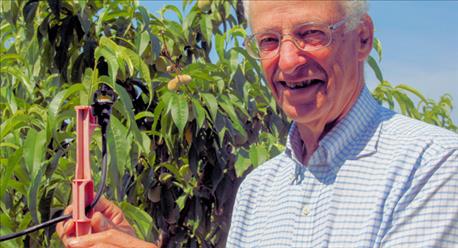
Tom Wickham knows better than most how precious freshwater is. Wickham’s Fruit Farm is surrounded by Long Island’s Peconic Bay and was hard-hit by Superstorm Sandy’s Atlantic surge in 2012. That only reinforced his passion for protecting freshwater resources. His best management practices earned him New York’s 2016 Agricultural Environmental Management Award.

CRITICAL BARRIER: This dike had to be partially rebuilt after 2012 Superstorm Sandy to protect freshwater supplies on Tom Wickham’s upper Long Island farm.
NYS Ag Commissioner Richard Ball is scheduled to present the 23rd annual award to Wickham during the New York Ag Leadership Luncheon at Empire Farm Days on Aug. 10. Suffolk County Soil and Water Conservation District will also be recognized for its efforts in helping the farm achieve high efficiency. The honor for both is well-deserved, according to Ball.
Protecting the fragile ecosystem
Waters of the Great Peconic Bay ripple on the shoreline dikes, protecting this Long Island farm’s more than 200 acres of fruits and vegetables. The 25-foot-high dikes are critical to keeping ocean saltwater from contaminating the freshwater aquifer for the farm and entire community.
When Superstorm Sandy blew through the dikes in 2012, the federal government stepped in to rebuild part of them. That weather disaster only intensified Wickham’s passion for developing long-term sustainable best management practices. That’s significant for a ninth-generation family farm dating back to 1661.
Today, the Wickhams’ land has been transitioned to son Jonathan. Tom Wickham and wife, Gekee, own the business side of it. “I’m just the farm manager,” he says.

LEAKPROOF CONTAINMENT: Suffolk Soil and Water Conservation District Technician Sharon Frost and Wickham tell visitors about this agrichemical containment building used to store, mix and load fertilizer and chemicals, plus prevent incidental leaking into the environment.
An ag engineer by training, he returned to his father’s farm in 1987. By 1999, the farm had put into place many BMPs and was one of the first 50 New York farms to have an AEM comprehensive farm plan.
BMPs boost nutrient and water efficiency
With environmentally sensitive sandy soils, efficient water and nutrient management, even precision pesticide use proved critical. Wickham says the farm’s environmental protection, water efficiency and conservation practices wouldn’t have been possible without the help of the Suffolk Soil and Water Conservation District and Cornell Extension’s Ag Stewardship Program.
Vegetable crops are on a three-year rotation with sorghum-sudangrass plowed and reseeded three times a season to build organic matter and nutrient-holding capacity. Orchards are sodded with slow-growing grasses to reduce rainwater runoff. Fruit trees are micro-irrigated to conserve water, and yet put down a quart per minute under each tree as needed in dry seasons.

DRIP DOESN’T DO IT: In dry seasons, micro-irrigation nozzles put down enough water for Wickham’s fruit trees. (Photo by Lisa Finn)
Traditional fuel tanks were replaced by double-walled, environmentally sound tanks. A weather station on the farm is networked with a statewide system to help fine-tune the farm’s integrated pest management system and predict water needs on the farm’s micro-climate.
Wickham also uses controlled-release nitrogen and the Adapt-N predictive program, which weighs weather and soil type to limit nutrient leaching. “It has reduced fertilizer usage by at least 10 pounds per acre, he confirms. “But the greatest value is keeping it out of the groundwaters.”
2016 AEM finalists
Two other environmentally conscious farms competed for the 2016 honors. They were:
Doyle Vineyard Management, Hammondsport, N.Y., is owned by Matt and Carre Doyle. They manage more than 900 acres of vineyards in five counties across the Finger Lakes region. They were nominated by Yates County Soil and Water Conservation District. The operation’s conservation plan is constantly evolving and raising the level of sustainable viticulture practices. Conservation practices put in place in several counties include agrichemical mixing facilities, diversion ditches and site evaluations of water runoff control before new plantings.
Dueppengiesser Dairy Co., Perry, N.Y., owned by Peter and Mike Dueppengiesser and families was nominated by Wyoming County Soil and Water. It’s a third-generation family farm, managing 1,000 milking cows plus young stock, and operating more than 2,000 acres of corn, alfalfa and wheat.
Environmental management practices have been continuously developed since certification of the farm’s nutrient management plan more than 15 years ago. Improvements include zone tillage, drainage and diversion ditches, a drag-line manure system and a manure solids separation system to recycle bedding.
The AEM award program boosts public awareness of farm efforts in preserving the environment. It’s co-sponsored by New York Department of Ag and Markets, Empire State Potato Growers and American Agriculturist.

HIGH-TUNNEL CHERRIES: Seasonal high-tunnels use a coverable structure to extend the season and help reduce nutrient and pesticide loss into groundwater.
About the Author(s)
You May Also Like




